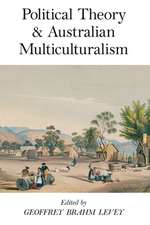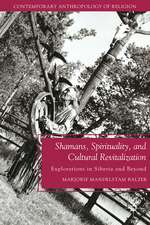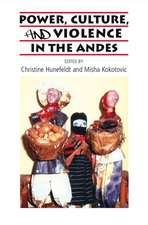The Ethnographer's Magic and Other Essays in the History of Anthropology
Autor George W. Stocking, Jr.en Limba Engleză Paperback – 31 oct 2018
For this collection, Stocking has written comments on each of the eight essays included, as well as an introduction providing autobiographical and historiographical context and an afterword reconsidering major themes of the essays in relation to the recent past and present situation of academic anthropology. The essays themselves address the work and influence of Franz Boas and Bronislaw Malinowski; anthropology's powerfully mythic aspect and persistent strain of romantic primitivism; the contradictions of its relationship to the larger sociopolitical sphere; its problematic integration of a variety of natural scientific and humanistic inquiries; and the tension between its scientific aspirations and its subjectively acquired “data.”
Preț: 172.40 lei
Nou
Puncte Express: 259
Preț estimativ în valută:
32.99€ • 35.95$ • 27.80£
32.99€ • 35.95$ • 27.80£
Carte tipărită la comandă
Livrare economică 23 aprilie-07 mai
Preluare comenzi: 021 569.72.76
Specificații
ISBN-13: 9780299134143
ISBN-10: 0299134148
Pagini: 448
Ilustrații: 19 halftones
Dimensiuni: 152 x 229 x 25 mm
Greutate: 0.59 kg
Ediția:1
Editura: University of Wisconsin Press
Colecția University of Wisconsin Press
ISBN-10: 0299134148
Pagini: 448
Ilustrații: 19 halftones
Dimensiuni: 152 x 229 x 25 mm
Greutate: 0.59 kg
Ediția:1
Editura: University of Wisconsin Press
Colecția University of Wisconsin Press
Descriere
For this collection, Stocking has written comments on each of the eight essays included, as well as an introduction providing autobiographical and historiographical context and an afterword reconsidering major themes of the essays in relation to the recent past and present situation of academic anthropology. The essays themselves address the work and influence of Franz Boas and Bronislaw Malinowski; anthropology's powerfully mythic aspect and persistent strain of romantic primitivism; the contradictions of its relationship to the larger sociopolitical sphere; its problematic integration of a variety of natural scientific and humanistic inquiries; and the tension between its scientific aspirations and its subjectively acquired “data.”













